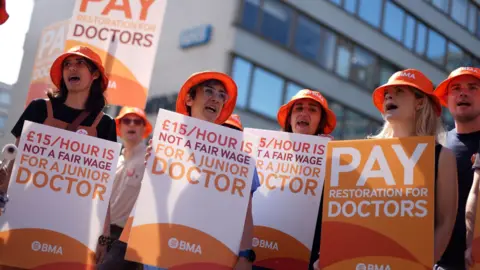Resident doctors vote to strike in England
 PA Media
PA MediaResident doctors in England have once again voted in favour of strike action, in the latest chapter in a long-running pay dispute.
The doctors, previously known as junior doctors, were awarded a 5.4% pay rise for this financial year, following a 22% increase over the previous two years.
But the British Medical Association (BMA) says wages are still around 20% lower in real terms than in 2008 and are demanding "pay restoration".
A government spokesperson said pay negotiations would not be reopened as: "We can't be more generous than we already have."
The BMA said 55% of its 48,000 resident doctor members voted in the ballot with 90% supporting industrial action.
The co-chairs of the union's junior doctors' committee, Ross Nieuwoudt and Melissa Ryan, said they would seek fresh talks with the government and there was still time to avert a walkout.
"Our pay may have declined but our will to fight remains strong," they said in a joint statement. "All we need is a credible pay offer and nobody need strike."
The union now has a mandate for possible industrial action for six months, up to January 2026.
The government said it was "disappointing" that the BMA was continuing to threaten industrial action after doctors had been awarded a pay rise of 28.9% over the last three years.
"We aren't going to reopen negotiations on pay," said a Downing Street spokesperson.
"Resident doctors have received the highest pay award across the public sector for two years in a row and we can't be more generous than we already have this year."
A 55% turnout in the ballot means, even with just over 90% of those voting in favour, fewer than half of eligible doctors actually backed strike action, the government added.
Long-running dispute
Resident doctors took part in 11 separate strikes during 2023 and 2024, leading to the cancellation of hundreds of thousands of outpatient appointments and other hospital procedures.
Matthew Taylor, chief executive of the NHS Confederation, which represents the providers of NHS services, said a strike could jeopardise attempts to cut waiting lists in England.
"It is disappointing that despite making ending the resident doctors' strikes a priority after entering office, the government is now back to where it was a year ago," he said.
"There is also the risk that these strikes heighten tensions within different staffing groups, with nurses and other staff also discussing industrial action."
Nurses and consultants
The term resident doctor can cover anyone who has just graduated from medical school through to those with ten years or more experience on the front line.
The BMA has said that other senior staff groups, including consultants and specialist doctors, will soon be asked whether they are willing to take part in industrial action after being offered a 4% pay increase.
And the Royal College of Nursing is currently consulting its 345,000 members in England, Wales and Northern Ireland on this year's pay offer after describing the 3.6% award as "grotesque".
